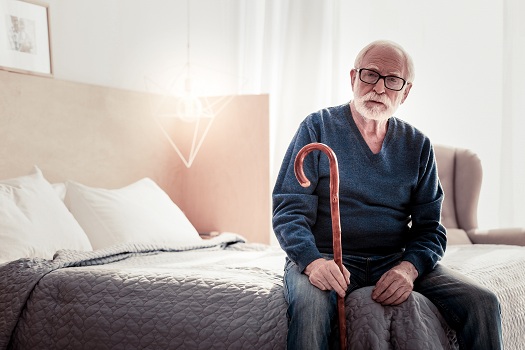Why Older Adults with Alzheimer’s Need Familiar Surroundings

In The Wizard of Oz, Dorothy echoed a common sentiment: “There’s no place like home.” Most people prefer living in known surroundings. For a senior loved one with Alzheimer’s disease, a familiar setting is vital to wellbeing. Here’s why consistency is so important.
Eases Cognitive Challenges
Seniors with Alzheimer’s disease have difficulty adapting to environmental change because it impairs their ability to:
- Process new stimuli
- Organize and plan
- Reason
- Make decisions
- Retain and recall recent information
The days, weeks, and months following an Alzheimer’s diagnosis can be challenging for both seniors and their families. However, these challenges can be made less stressful with the help of caregivers trained in professional Alzheimer’s care. Dallas Home Care Assistance is here to help your loved one enjoy the golden years while simultaneously managing the symptoms of Alzheimer’s.
Prevents Negative Emotional Reactions
Altered surroundings tend to evoke fear and insecurity. If you try to explain why something is different, your loved one may not understand. Other common responses to changes are agitation and frustration. A usually sweet senior faced with the unknown may become angry. The stress of having to face change is so draining that it can be exhausting for seniors with Alzheimer’s.
Reduces the Risk of Wandering
Unfamiliar surroundings may prompt wandering. Other causes of roaming are confusing situations, loud noises, and busy activity. Your loved one may get disoriented while searching for a familiar object or person or gear up for a past routine that was purposeful or rewarding, such as going to work, buying groceries, or visiting a friend.
To prevent wandering, keep your loved one engaged in favorite activities. If roaming tends to occur at a certain time of day, plan a fun exercise. At all times, ensure your loved one has the company of a responsible caregiver with insight into Alzheimer’s behaviors.
A 2009 study found a familiar home environment reduces the tendency to wander and increases functional ability. The research involved 77 seniors with spatial disorientation who were living at home with caregivers and was published in the Journal of Clinical Nursing.
Activates the Memory
Until the late stages of Alzheimer’s, long-term memory generally stays intact, so the distant past is a main point of reference. Recognizable objects spark the mind, reminding seniors how to perform daily tasks. In turn, self-reliance promotes independence, self-esteem, dignity, and security.
Examples of cognitive touchstones are familiar furniture, photographs, clothing, and food. Seeing objects in their usual locations provides a sense of order and control. Conversely, rearranged or misplaced items may be perceived as stolen. Repeated modifications to the home setting may evoke paranoia.
Many older adults are choosing to age in place, and some need a helping hand to continue living at home safely and comfortably. Luckily, there is professional elder care Dallas seniors can trust and rely on.
Promotes Comfort
Try to keep the home environment the same regarding furniture, wall décor, and personal belongings. Such objects serve as compass points, helping your loved one navigate rooms and supporting safety and independence. Photos of beloved faces in their customary places may be reassuring.
Strive to maintain a calm, pleasant, and comfortable atmosphere. Factors to assess are indoor climate, sounds, and scents. Consider placing fresh flowers or plants around the home. Although they may be new accessories, your loved one might find them delightful.
Also, use lighting to aid orientation. Sunshine streaming through windows announces daytime, inviting activity. At night, dimmer switches and soft lamplight foster sleep.
Establishes Routines
Supplement a stable environment with daily routines to help your loved one align to time and place. Also, encourage past activities that formerly brought comfort, joy, serenity, contentment, and other pleasant feelings. Examples are hobbies, singing, and reading. Long-term musical memory is the most enduring form of recall, even during late-stage Alzheimer’s.
When altering the environment is inevitable, you can facilitate adjusting. Prior to the change, brief your loved one about what’s ahead. Even if you’re not sure he or she will understand, explain what to expect. Remind him or her a day in advance and just before the event. Speak concisely and in short sentences, making information easier to remember.
If you sense uneasiness, reassure your loved one that he or she is safe and all is well. Affirm that you’ll do everything possible to keep him or her comfortable. Use encouraging gestures, including smiles, hugs, and kisses. Keep your tone cheerful and upbeat. You can also provide a known object that fosters security, such as a favorite sweater, lap blanket, or book.
If your loved one has been diagnosed with Alzheimer’s and you need additional help, consider hiring a professional caregiver. There are many reasons seniors might need assistance at home. Some may require regular mental stimulation due to an Alzheimer’s diagnosis, while others might only need part-time assistance with exercise and basic household tasks. Home Care Assistance is a leading Dallas senior care provider. Families rely on our expertly trained caregivers to help their senior loved ones maintain a high quality of life. To schedule a free in-home consultation, give us a call at (214) 363-3400 today.

